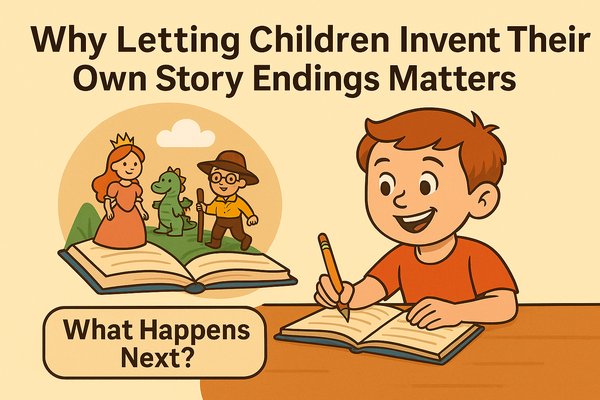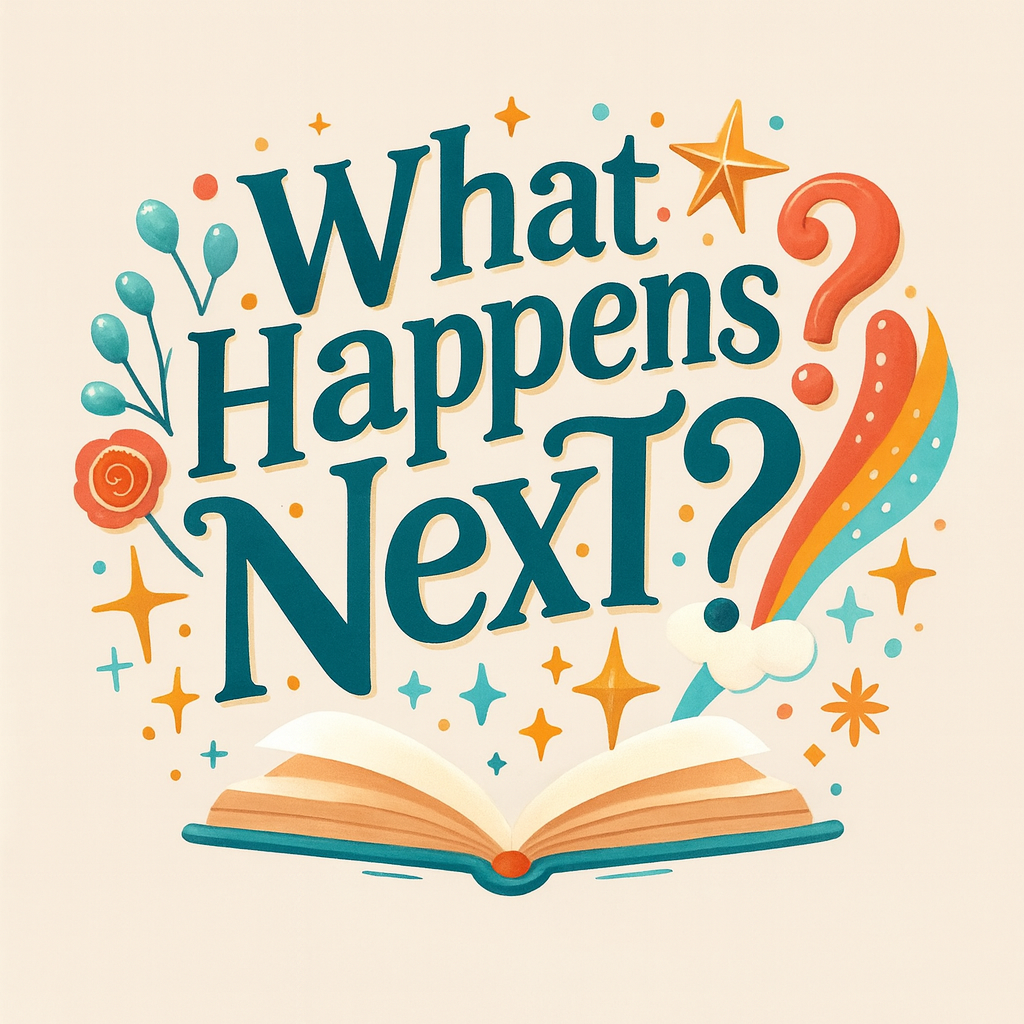Why Letting Children Invent Their Own Story Endings Matters

Reading stories together isn’t just a lovely family ritual — it’s one of the most powerful ways to develop imagination, language and confidence in children. When a child is invited to decide *what happens next*, they become an active creator rather than a passive listener.
According to **BookTrust**, storytelling “helps children make sense of the world, develop empathy and strengthen relationships through shared imagination” ([booktrust.org.uk](https://www.booktrust.org.uk/)). Allowing them to reshape endings, invent new characters, or change the outcome deepens that connection — transforming a simple story into a personal adventure.
At **What Happens Next?**, we invite young readers to “step into a world where nothing is decided — until you choose what happens next.” Every unfinished story becomes a playground for ideas, where imagination and authorship grow hand in hand.
---
### ✨ Key Benefits of Inventing Story Endings
#### 1. Developing imagination and creativity
Children love exploring different outcomes. When they imagine alternative endings, they practise flexible thinking — an essential life skill. The UK’s **Early Years Foundation Stage (EYFS)** framework highlights creativity as vital for emotional and cognitive growth, encouraging children to “explore, express and share ideas in imaginative ways” ([help-for-early-years-providers.education.gov.uk](https://help-for-early-years-providers.education.gov.uk/areas-of-learning/expressive-arts-and-design/imagination-and-creativity)).
#### 2. Strengthening language and literacy skills
By extending stories, children practise new words and structures naturally. As **National Literacy Trust** explains, storytelling helps build vocabulary, comprehension and confidence in speaking — all crucial for school readiness and later learning ([literacytrust.org.uk](https://literacytrust.org.uk/)).
#### 3. Building empathy and emotional awareness
Stories are emotional journeys. When children imagine what a character might feel or decide, they exercise empathy — understanding other perspectives. **Kumon UK** notes that storytelling “encourages children to put themselves in the protagonist’s place,” helping them develop emotional intelligence ([kumon.co.uk](https://www.kumon.co.uk/blog/the-benefits-of-storytelling)).
#### 4. Boosting confidence and sense of agency
Every time a child invents an ending, they learn that their ideas matter. That sense of authorship — “*I can make the story mine*” — builds resilience and ownership of learning. Research by **Community Playthings UK** confirms that active storytelling “nurtures confidence, self-expression and belonging” ([communityplaythings.co.uk](https://www.communityplaythings.co.uk/learning-library/articles/power-of-storytelling)).
#### 5. Strengthening family and classroom bonds
Shared storytelling connects people. When families or classmates co-create a tale, they listen, laugh and problem-solve together — forming genuine bonds. As the **British Council** points out, storytelling “creates shared moments that unite speakers and listeners through language and imagination” ([teachingenglish.org.uk](https://www.teachingenglish.org.uk/professional-development/teachers/managing-resources/articles/storytelling-benefits-and-tips)).
---
### 💡 How Adults Can Support the Magic
Whether you’re a parent, teacher, or librarian — here are simple ways to inspire creative endings:
1. **Pause before the ending.** Ask, *“What do you think happens next?”*
2. **Give time.** Let children explore possibilities — there’s no wrong answer.
3. **Listen with enthusiasm.** Celebrate their ideas, however surprising.
4. **Act it out.** Use props, drawings, or voices to bring endings to life.
5. **Capture creativity.** Write down their version, publish it online, or display it proudly.
6. **Encourage collaboration.** Let children build on each other’s endings — it builds teamwork and imagination.
---
### 🌍 Creative Storytelling in the UK Context
Storytelling is embedded in UK education — from **EYFS expressive arts** to **Key Stage 2 English**. Schools and libraries increasingly use creative writing projects to nurture voice and confidence.
Platforms like *What Happens Next?* make that practice accessible beyond the classroom. Children can read unfinished stories online and write their own endings, share them safely, and see their work valued by others — turning creativity into community.
This approach aligns with the **National Curriculum’s** focus on composition, empathy and imagination in writing, showing that creativity isn’t just an art form — it’s literacy in action.
---
### ❤️ In Summary
When a child invents an ending, they do more than complete a story — they learn to think independently, empathise deeply, and believe in the power of their own ideas.
By reading, wondering, and creating together, we help children grow into confident storytellers — and lifelong readers.
So next time you read a bedtime story or lead a class session, pause before the final line and ask:
**“What happens next?”**
You might be amazed by the worlds they imagine.
---
### 📚 Sources and Further Reading
* **BookTrust –** [How storytelling helps children learn](https://www.booktrust.org.uk/)
* **Kumon UK –** [The Benefits of Storytelling](https://www.kumon.co.uk/blog/the-benefits-of-storytelling)
* **British Council –** [Storytelling: benefits and tips](https://www.teachingenglish.org.uk/professional-development/teachers/managing-resources/articles/storytelling-benefits-and-tips)
* **Community Playthings UK –** [The Power of Storytelling](https://www.communityplaythings.co.uk/learning-library/articles/power-of-storytelling)
* **Early Years Foundation Stage –** [Imagination and creativity guidance](https://help-for-early-years-providers.education.gov.uk/areas-of-learning/expressive-arts-and-design/imagination-and-creativity)
* **National Literacy Trust –** [The role of storytelling in literacy](https://literacytrust.org.uk/)
* **What Happens Next? –** [Interactive storytelling platform for young readers](https://whathappensnext.online)

 English
English
 polski
polski



